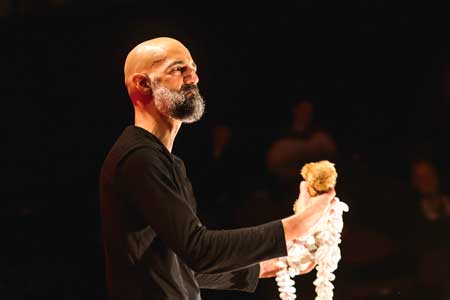Play (1599)
by William Shakespeare
Directed by Igor Golyak
Actors’ Shakespeare Project
Boston Center for the Arts
South End, Boston
September 23 – October 17, 2021
With Anna Bortnick (Jessica), Darya Denisova (Nerissa), Jesse Hinson (Bassanio), Nael Nacer (Shylock), Jordan Palmer (Launcelot Gobbo), Dennis Trainor (Antonio), Peter Walsh (Lorenzo), Gigi Watson (Portia)
Dewey Dellay Composer/Sound Designer, Ksenya Litvak Puppet Designer

Antonio, the eponymous Merchant of Venice, borrows money from Shylock, a Jew, who asks for security in the form of Antonio’s flesh. Not expecting to have to pay this security deposit, Antonio does not worry about it until it comes to pass that he cannot repay the debt. Shylock, resentful of his status as a Jew and the way that Antonio and his ilk regard him, demands his security payment. Portia, lover of Bassanio, Antonio’s good friend, comes to the rescue and offers one of the best courtroom defense speeches in the history of drama.
With the return of ASP to live theater after a year and a half’s abeyance during the pandemic, this production represents, as the Master of Ceremonies who doubles as Antonio (Dennis Trainor) declares at the outset, is a cathartic gag of sorts, a boisterous romp that allows the audience to release a little of its own frustrations from that past year and a half. For the bulk of the performance, the cast encourages loud and demonstrative audience responses and the goings on onstage are pretty much nonstop rambunctious. There is some of Shakespeare’s dialogue from the play included, but it is minimal. There are, in place of that, a bunch of gag routines, modern pop songs, and a lot of tomfoolery.
The intent, in addition to providing hilarity and exuberant catharsis for the audience, is to spoof Shakespeare’s problematic take on Jews. By making it extreme and histrionic, the production attempts to show how bizarre Shakespeare’s portrayal of Shylock is. In service to this end, Shylock, played characteristically expertly by the inimitable Nael Nacer, wears a kind of Commedia dell’Arte mask with a huge hooked nose. When Shylock covers his face with it, his voice changes into a caricature of a Jew; but when Shylock lifts the mask and shows his own face, the voice changes and Shakespeare’s memorable words about how a Jew bleeds like everyone else takes on a powerful quality.
As far as I got on the first night of my attendance at the play, the rambunctiousness seemed, in some interesting way, to inform the underlying feeling of the misrepresented Jew. Unfortunately, amid the rambunctious goings on onstage, one of the actors was seriously injured and the performance had to be stopped after the very beginning of the second act. In some sense, odd and unexpected that this actor slammed himself into a wall, but, given the totally wild tone of the whole enterprise, it actually did not seem unexpected that this sort of thing could happen. When it did, the Dennis Trainor, not in role, came out to announce that something had happened and that this announcement did not represent a meta-dimension to the performance. However, even after the house manager came to say there would be an announcement in a little while and someone started to sweep up the remnants of a glass bulb that had broken on to the stage as well, the fellow sitting next to me still wondered whether all of this were part of the performance. The rest of it had seemed far enough out there in terms of meta-statements to merit that conclusion. But, indeed, the actor had smashed his face into the wall and needed to be attended to at an emergency room.
After seeing the first half of the production, I could say that the initial part promised a kind of revelation of the bizarreness of the play through its radical and stark counter-positioning of the hilarious takeoffs and the intermittent but sober speeches about prejudice. Of course, Shakespeare never met a Jew. Jews had been expelled from England in the late thirteenth century and were not readmitted until the late 17th century. So, everything in The Merchant of Venice is based on a mythology about Jews, which makes it such an odd play to watch these days.
I appreciated the production’s attempt to reflect viscerally on this oddness by creating the pantomimish context. Certainly, the use of the mask for Shylock was very ingenious, and Nael Nacer did a terrific job of counterposing the two personas of the character. But, after viewing only the first act, there is something a little too hysterical and histrionic about this production. The use of some of those techniques, but with a greater fidelity to the original Shakespearean text, would have been welcome. When Benjamin Evett launched ASP in 2004, it was with the intent of doing Shakespeare inventively, but with faith to the original text. After seeing the first act only, one might judge that this production represents a departure from that approach, and its rambunctious departure from the original seems more appropriate for one of the jazzed up, pre-Broadway takeoffs that Diane Paulus constructs at the ART to reach a wider audience. This approach seems less germane to what ASP has traditionally done so well – simply staged, but brilliantly directed and acted, versions of what The Bard wrote.

in “The Merchant of Venice”
Photo: Courtesy of Actors’ Shakespeare Project
Well, I went back the next night. ASP offered tickets for another performance, and I hopped on my bike and made another journey across town to the Boston Center for the Arts. I’m glad I did; it was worth it. The actor who smashed into a wall had to be seen at the hospital, but he returned, with great energy, professional grace, and a bit of extra makeup on his smashed nose, for the next night’s performance.
The denouement is compelling and quite unexpected. The audience is prepped towards unbridled hilarity almost throughout, though, Nael Nacer’s Shylock at times de-masks and gives a sense of what lies underneath all the hilarity. The final scene of the production is majestic and somber to the core. One sees, vividly and consciously, the violations implicit in the theme of the mis-portrayed Jew and realizes the dire consequences thereof. The last moments of the play are so shocking that one can barely give it words. In its wake, the cast comes out and shares a moment of silence with audience, not saying anything save for Nael Nacer who briefly but eloquently notes the dangerous rise of anti-Semitism and racism throughout the world in recent years.
This indeed is a powerful and significant ending and makes one certainly reflect on the categorization of Merchant as one of Shakespeare’s comedies. The extreme hilarity exercised and cultivated throughout the performance represents a textual highlighting of what comedy is. Given this kind of sober reflection on extrapolated pantomime, how can one ever see this as a comedy again? It will forevermore not only be a problem play, but, worse than that, an unwitting tragedy of unconsciously prejudicial authorship attempting satire.
One might give the epigraph laughing all the way to the gas chamber to this play as seen through the harsh but bold eyes of this production. The early hilarity is extreme, the manipulation of the audience transparent, and the muting of the original Shakespearean text a liability, but, despite all of this, the overall intent, and the power of the result, is significant. ASP and director Igor Golyak deserve praise for experimenting boldly with this production – it’s flawed, it’s full of edges, it’s not quite Shakespeare, but, in the end, it’s powerful.
In the role of Shylock, Nael Nacer is his usual potent, incredible self. As Portia, Gigi Watson is lively and maintains a commanding presence throughout. Jesse Hinson as Bassanio is robust, sometimes to the Nth degree. Dewey Dellay’s music and soundscape is complex, engaging, and effective.
– BADMan (aka Charles Munitz)
Leave a Reply